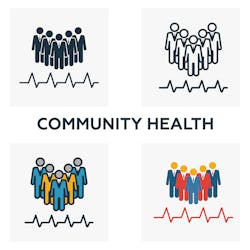PCORI Grant Allows Community Health Worker Program to Scale Up
As social determinants of health take on more importance for health systems, community health workers are playing a key role. During the annual meeting of the Patient-Centered Outcomes Research Institute (PCORI) on Sept. 19, leaders of Penn Medicine’s IMPaCT (Individualized Management for Patient-Centered Targets) program discussed their efforts to scale their program nationally. IMPact hires and trains trusted neighborhood residents to become community health workers.
The community health workers carry out culturally appropriate outreach activities, social support, patient advocacy and health system navigation.
Shreya Kangovi, M.D., M.S.H.P., founding executive director of the Penn Center for Community Health Workers and developer of the IMPaCT program, noted that IMPaCT is one of the few evidence-based community health worker models in the country, having published three randomized control studies consistently showing improved cost, experience and health outcomes. It has served nearly 10,000 patients in the Philadelphia region. It translates into $2 saved for every dollar invested, she said.
She described a treatment that improved mental health, reduced A1C levels, improved blood pressure, and reduced hospital days — and it wasn’t a drug. The key ingredient was empathy.
“We all know that empathy is powerful,” said Kangovi, an internist, pediatrician and health policy researcher. “How do we package it and consistently deliver results?”
In the last three years, IMPaCT has been replicated by organizations across 15 different states including Veterans Health Administration, state Medicaid programs, integrated healthcare organizations and even retailers. But there has been great variation in how the programs were implemented. “Community health workers can be helpful, but the programs require precision to develop,” said Kangovi, the recipient of the 2019 Robert Wood Johnson Foundation Health Equity Award. IMPaCT is starting to work more closely with other organizations to replicate its successful model in Philadelphia.
Kangovi’s group is using a 3-year, $1.4 million award from PCORI to help three new sites establish community health worker programs, based on the IMPaCT model, to serve 4,600 low-income and chronically ill Americans. IMPaCT personnel from Penn are collaborating with the Wilmington, Del., VA Medical Center; the Pittsburgh VA Medical Center; and Blue Cross and Blue Shield of North Carolina’s new Medicaid program.
Keysha Brooker, M.S.W., an IMPaCT Trainer, joined Kangovi on stage at the PCORI event to share her story. She said that in 1998, at age 25, she was diagnosed with prediabetes. She was unemployed with two children and living in her mother’s basement. When she left the doctor’s office, she was worried about this diagnosis, but had to focus on her children and on finding a job. “I had to focus on life itself,” she said. “Getting out to exercise and focusing on eating right wasn’t in the stars for me.”
Fast forward to 2015, and Brooker became an IMPaCT community health worker. She described working with a woman who had struggled with addiction, mental health issues and diabetes, and had been kicked out of every dialysis center in the city. After building a personal relationship with the woman, Brooker was eventually able to connect her to a safe place to live, a new dialysis center and transportation there. “She reconnected with her psychiatrist and family, and outpatient drug and alcohol unit,” Brooker said. “She still has fears of a setback, but she loves to live in the moment.”
Now with a master's degree in social work, Brooker has become a certified IMPaCT Trainer, working with other organizations across the country. She said she sometimes hears patients referred to as noncompliant, difficult or even lazy. “That type of language does not fit the empathetic nature of the work,” she said.
“What Keysha did was magical but not accidental,” Kangovi said. “She was hired using algorithms to identify helpers in the communities. The Penn IMPaCT model includes standardized work practice manuals and specialized software for hiring and training lay residents to become community health workers, as well as operationalizing the program to scale.


